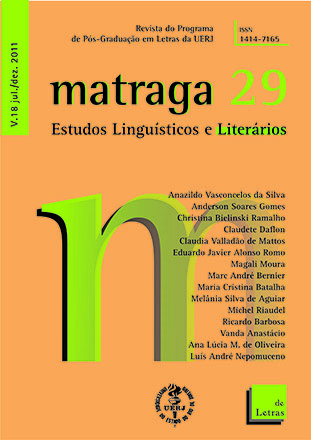‘Caramuru’ e a segunda queda do ameríndio
Palavras-chave:
Caramuru, Ameríndios, são Tomé, Monogenismo, DegenerescênciaResumo
O descobrimento da América suscitou surpresa e questionamentos vários sobre a noção de humanidade, o sentido da história, os fundamentos das organizações sociais… Nessa linha de pensamento surgiram reflexões (Thomas More, Montaigne, Rousseau…) acentuando as diferenças culturais e insistindo na ruptura de perspectivas, seja para redefinir o télos europeu, seja para fundar suas críticas do Velho Mundo. Contudo, dentro da lógica cristã, a exigência era pelo contrário reintegrar o Ameríndio no universo das Sagradas Escrituras, demonstrando que Deus não abandonara a América – tendo mandado santos (por ex. são Tomé), e deixado sinais múltiplos da Revelação –, mas que o “Americano” ou “Brasílico”, ele sim, tinha se desviado de Deus e das verdades divinas originais. Assim, aqueles que possivelmente não moravam tão longe de vestígios do Paraíso Terreal foram submetidos a um segundo processo de condenação, à imagem da Queda que conheceram Adão e Eva. Talvez o poema épico de Santa Rita Durão, Caramuru (1781), seja o último exemplo desse raciocínio, no mundo colonial luso-brasileiro; no momento em que o conceito de “degenerescência” estava sendo assimilado pelo discurso racionalista e científico de parte do contexto iluminista e pelas políticas civilizatórias do século XIX.
Downloads
Downloads
Publicado
Como Citar
Edição
Seção
Licença
AUTORIZAÇÃO
A Matraga – Revista do Programa de Pós-Graduação em Letras da UERJ está autorizada a publicar o artigo ora submetido, caso seja aceito para publicação online. Fica atestado que a contribuição é original, que não está sendo submetida a outro editor para publicação, e que a presente declaração é a expressão da verdade.
Os trabalhos publicados no espaço virtual da Matraga – Revista do Programa de Pós-Graduação em Letras da UERJ serão automaticamente cedidos, ficando os seus direitos autorais reservados à Matraga. Sua reprodução, total ou parcial, é condicionada à citação dos autores e dos dados da publicação.

A Matraga utiliza uma Licença Creative Commons - Atribuição-NãoComercial 4.0 Internacional.





